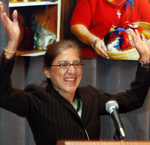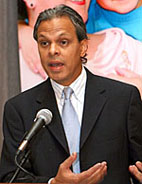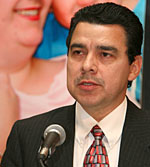
Redes En Acción 2007 NSC Participants
August 1-3, 2007. Redes En Acción's "ripple effect" in promoting Latino cancer research, training and awareness may create "a tsunami that can wipe out cancer disparities among Latinos," noted a participant at the recent 7th Annual Redes En Acción National Steering Committee Meeting.
More than 80 Latino health and cancer authorities gathered from around the country to celebrate the initiative's achievements over the past seven years and hear a variety of panel presentations and guest speakers. The theme of this year's meeting was Amplifying the Redes Ripple Effect.
"In the same way a raindrop creates a ripple when it hits a still body of water, a Redes ripple is created when our network members conduct research, training or many other activities that help reduce health disparities among Latinos across the nation," said Amelie G. Ramirez, DrPH, Redes En Acción Principal Investigator. "It gives me great satisfaction and pride to observe this Redes ripple effect yield more and more ripples as we continue to shape this program into one of growing influence."
Although the "ripples" created by Redes En Acción are reflected in a variety of innovative strategies addressing cancer disparities in the country's Latino population, perhaps the most dramatic impact has been seen in programs promoting new research.
 "If you want to know what a Redes ripple looks like," said investigator Anna Nápoles-Springer, PhD, "you're looking at one."
"If you want to know what a Redes ripple looks like," said investigator Anna Nápoles-Springer, PhD, "you're looking at one."
After receiving National Cancer Institute support through the Redes pilot project program, Dr. Nápoles-Springer has garnered additional research funding from NCI and the California Breast Cancer Research Program. As a pilot research program success story, at the meeting she participated on a panel titled "The Redes Ripple Effect: Research & Training." Another panel presentation, "The Redes Effect: Public Education Dissemination," highlighted several collaborations with organizations around the United States and Puerto Rico to raise awareness of cancer issues among Latinos.
 In addition to the numerous examples of Redes En Acción's continuing impact on cancer among Latinos, the meeting produced insight into possible paths to resolving disparities affecting this population. Guest speaker Eduardo Sanchez, MD, Director of the Institute of Health Policy, University of Texas School of Public Health at Houston, advocated a focused effort in changing health policy.
In addition to the numerous examples of Redes En Acción's continuing impact on cancer among Latinos, the meeting produced insight into possible paths to resolving disparities affecting this population. Guest speaker Eduardo Sanchez, MD, Director of the Institute of Health Policy, University of Texas School of Public Health at Houston, advocated a focused effort in changing health policy.
Getting the message across to policymakers, he said, requires activists to prepare, connect, educate, ask and follow up -- and show the perception, practicality, price and politics of the policy issue being addressed.
"Providing assistance is not a sign of weakness," Dr. Sanchez emphasized. "It's empowerment."
Earlier in the meeting, participants heard speaker Leonel Vela, MD, outline a model program aimed at reducing health disparities in an area of Texas with a dense concentration of Latinos. Dr. Vela is Regional Dean of the Regional Academic Health Centers (RAHC), University of Texas Health Science Center at San Antonio.
 In his "Case Study: South Texas Initiative" presentation, Dr. Vela described achievements of the RAHC program in the Lower Rio Grande Valley. The original Center, opened in Harlingen five years ago, is working to counter the significant physician shortage in the region.
In his "Case Study: South Texas Initiative" presentation, Dr. Vela described achievements of the RAHC program in the Lower Rio Grande Valley. The original Center, opened in Harlingen five years ago, is working to counter the significant physician shortage in the region.
Dr. Vela termed the RAHC "a catalyst ushering in new hope for health care in this area...We believe it will transform the health status of one of the most underserved areas of the country."
The meeting's slate of panel presentations examined cutting-edge Latino health and cancer activities. The "New Directions in Latino Health Research & Advocacy" panel featured National Institutes of Health cancer authorities. Representing NCI were Jorge Gomez, MD, PhD, Chief, Organ Systems Branch and Shobha Srinivasan, PhD, Health Disparities Research Coordinator, Division of Cancer Control and Population Sciences.
The panel also included Paul Sorlie, PhD, Chief, Epidemiology Branch of the National Heart, Lung, and Blood Institute, who is directing the largest long-term epidemiological study of health and disease in U.S. Latinos -- the $61 million, multi-site Hispanic Community Health Study. Two Redes En Acción Co-Principal Investigators, Gregory Talavera, MD, MPH, and Frank Penedo, PhD, joined Dr. Sorlie on the panel to discuss their key roles in this historic research project.
Another panel, "Different Perspectives in Cancer Research," included Holly Howe, PhD, Executive Director of the North American Association of Central Cancer Registries; Andy Miller, MHSE, CHES, Director of Survivorship for the Lance Armstrong Foundation; and J. Emilio Carrillo, MD, MPH, Redes En Acción Co-PI for the Northeast Region, who represented the New York-Presbyterian Community Health Plan, New York Weill Cornell Medical Center.
In addition to the panel presentations, guest speaker Tim Mahoney, Associate Director of Government Affairs for the National Hispanic Medical Association, provided updates on several Congressional bills that, if enacted, would be significant to Redes En Acción efforts to reduce Latino cancer disparities.
What Is Redes En Acción? Redes En Acción is a major NCI-supported initiative to combat cancer among Latinos through a nationwide network of community-based organizations, research institutions, government health agencies and the public. Core activities include promoting cancer training and research opportunities for Latino students and researchers, generating research projects on key Latino cancer issues, and supporting cancer awareness activities within the Latino community.
The initiative is coordinated by the Institute for Health Promotion Research at The University of Texas Health Science Center at San Antonio, with regional network centers in San Antonio, New York, Miami, Chicago, San Francisco and San Diego.



